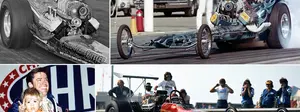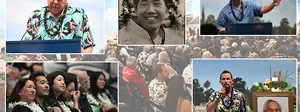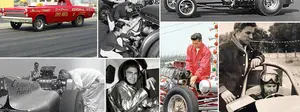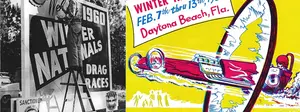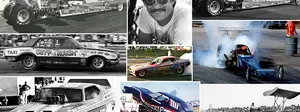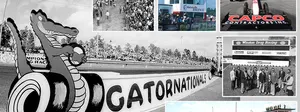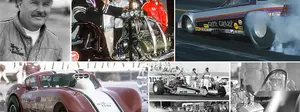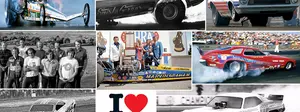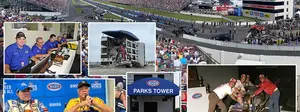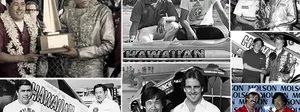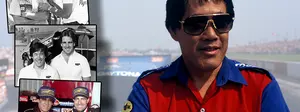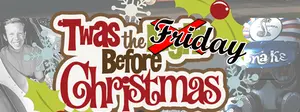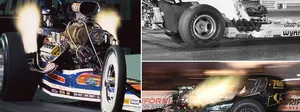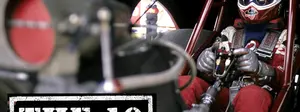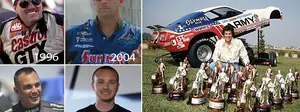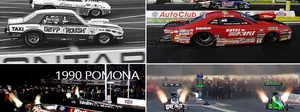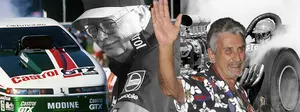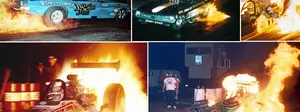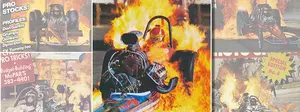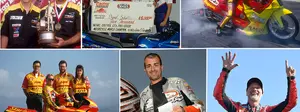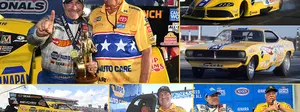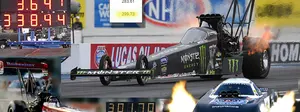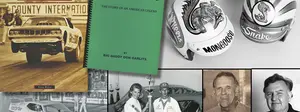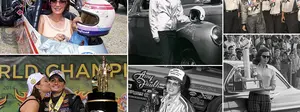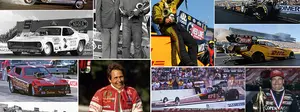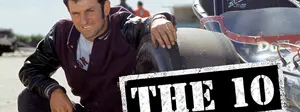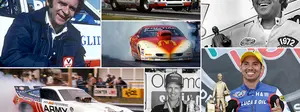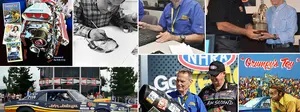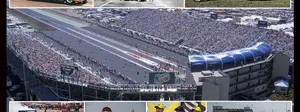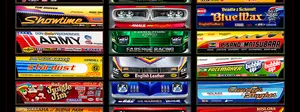1970s Funny Cars!
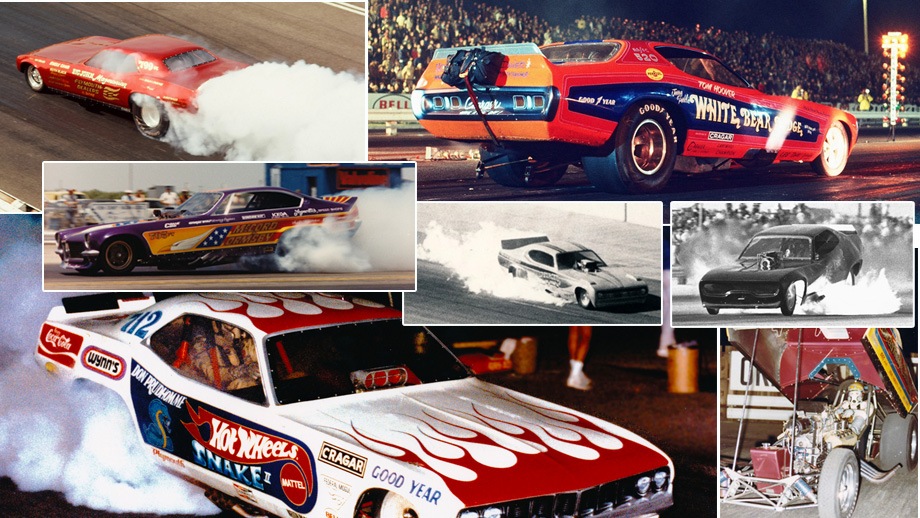

As I continue to work my way through the photo library of Ron Lewis, who generously shared with me thousands of images from his five decades of covering drag racing, we arrive at the one I’ve been most looking forward to: 1970s Funny Cars.
These are the cars that wowed teenage me, from my introduction via the Hot Wheels cars of Don Prudhomme and Tom McEwen that raced across my bedroom floor to my earliest visits to places like Orange County Int’l Raceway and Irwindale Raceway where I fell in love with the nitro-laced wonder of it all, the snorting dry hops, the wild and unpredictable machines, the majesty of the paint schemes, and the cast of characters that became like family to me, some of them as distant relatives you might only see around the holidays and even more that lived in my neighborhood and visited often.
As with the previous installments on 1960s nitro cars and 1970s Top Fuelers, Lewis’ work in largely SoCal-centric, but that works perfectly in this case because no matter what the guys on the East Coast or in Texas might tell you, California is the home of the nitro Funny Car, and I’ve got the numbers to prove it.
Don Ewald’s wonderful We Did It For Love site includes a handy (and much-used by me) section that pairs drivers with their NHRA permanent numbers from the 1960s and ‘70s. It’s not only an essential reference guide to determine who was driving, say, the Hawaiian in any particular photo, but also about the strength in numbers.
According to WDIFL, from 1966, the first year of the class, through 1979, there were 172 licensed Funny Car drivers -- from Jim Adolph to Tom Zedaker -- in California-dominant Division 7, which was more than double the next closest, which was Division 4 (Texas and the Southwest) with 82, and the California total does not include guys who made their careers on the West Coast but were initially licensed in other divisions, like Willie Borsch (2), Gary Ritter (5), Dave Benjamin (5), and Larry Fullerton (2).
Behind Divisions 7 and 4 were, predictably, Division 1/East Coast (76), Division 3/Midwest (66), Division 5/Rocky Mountain/Great Plains (57), Division 2/Southeast (53), and Division 6/Northwest (35). If you’re keeping score (and why wouldn’t you?) that’s 541 licensed Funny Car drivers.
But I digress. Without further ado, and with another thank-you nod to Ron Lewis, here’s a look at some great ‘70s floppers; again, not a history, just the ones that piqued my interest.

You can’t launch a tribute to ‘70s Funny Cars without the star of the show, which, of course, was Don Prudhomme. This is the 1971 car (which debuted at the ’70 Supernationals) and is the car that famously flew through the lights in Seattle. Few people remember but “the Snake” didn’t win an NHRA national event in Funny Car until Indy 1973 and only had three combined wins through the end of 1974, but we all know what happened after that with the Army Monza that appeared in 15 of 16 final rounds in 1975-76 and won 13 of them. (Can you name the only final he didn’t appear in, and the finalists? Answer here)
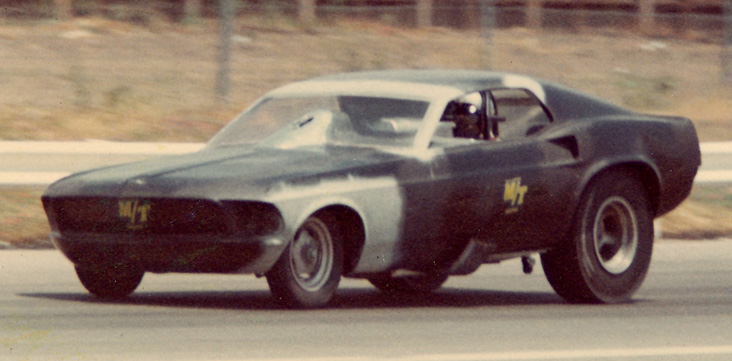
Mickey Thompson’s blue, Danny Ongais-driven 427 Ford SOHC-powered Mustang was one of the toughest cars of the late 1960s, winning the 1969 NHRA Springnationals in Dallas and the Nationals in Indy. I wrote a couple of articles about it a few years ago that can be found here and here. I’d wager to say that this is the same car in early shakedown runs at OCIR.
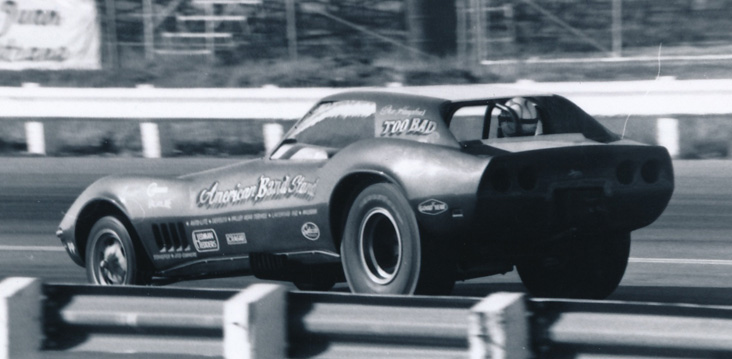
Here’s a rarity: Don Hampton’s two-engined American Bandstand Corvette. Yes, you read that right. The car was the follow up to the 1970 Winternationals-winning Dye & Hampton Too Bad AA/Comp dragster and featured side-by-side small-block Chevy power. It ran until it was destroyed in a 1974 accident in Australia. There were at least two other twice-motored Funny Cars -- Dean Dillingham’s A&W Root Beer Special Nova (also twin Chevy small-blocks but inline), and Junior Brogdon’s Phony Pony Mustang (injected small-block Fords inline). Danny White, the pre-eminent expert on 1970s (and ‘60s) Funny Cars, wrote a story about the American Bandstand car that can be found on the DragList website.
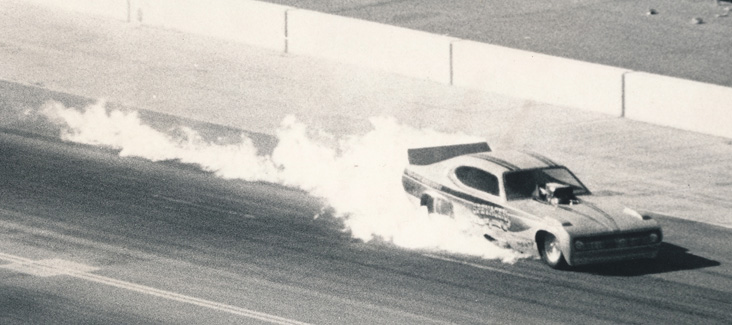
Great Falls, Mont.’s Bill Spevacek is probably and unfortunately best remembered for this top-end torch job at the 1974 World Finals at Ontario Motor Speedway but his real claim to fame ought to be that he was one of just two drivers to beat Don Prudhomme in head-to-head points-earning competition in 1976. Most everyone knows the first guy as Gary Burgin, who beat “the Snake” at Indy to end what was a 30-round national event win streak. Months earlier though, Spevacek didn’t beat Prudhomme as much as Prudhomme beat himself, red-lighting to Spevacek in the final round of the Division 5 event at Colorado’s Pubelo Motorsports Park (back when the Pros ran divisional events as part of their score). According to a story in the May 24, 1976 edition of Colorado Springs Gazette Telegraph, Prudhomme “let his car roll back a few inches just before the amber light turned to green, and as thin as he usually cuts a light, the motion took his front wheel right out of the beam.” That’s some pretty solid reporting for a local newspaper guy, whose work was uncredited.
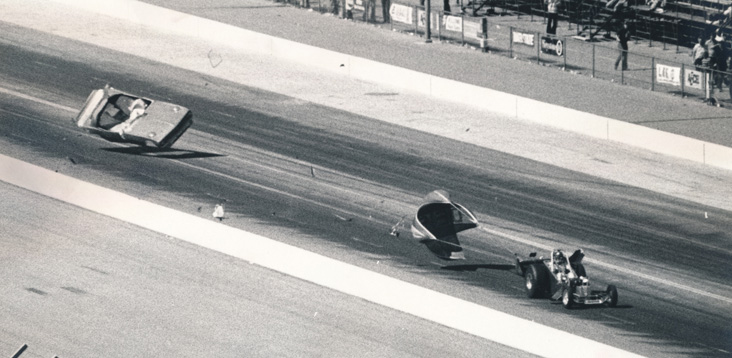
The ’74 Finals was hard on Funny Cars. Just ask Jeff Courtie, who suffered a body-popping blower explosion at the event. Courtie was a subject of one of my earliest Dragster Insider columns.

The greatest thing about this photo of Prudhomme at Pomona in 1979 is the iconic snow-covered San Gabriel Mountains behind the track (a scene way more regular back then that in today’s drought-parched SoCal) but I’m pretty sure that “the Snake” would be happy to forget about the 1979 Winternationals. (We know this is 1979 because even though he won Pomona with a similar-looking car in 1977 and '78, those cars had a Crower eight-port injector and not the three-hole Enderle "birdcatcher" shown here.)
After winning the Winternationals four straight years, 1975-78, “Prudhomme’s Pomona magic ended in 1979 when he lost in round one to Billy Meyer, a portent of things to come as he also lost his world championship to Raymond Beadle after scoring just one event win, in Canada, after three-win seasons in ’77 and ’78. But don’t cry too hard for him. I rewatched the mid-1980s Diamond P video Don Prudhomme, Professional Drag Racer on YouTube last week and was surprised to hear “the Snake” say it was a relief not to win the championship because every year that he and Bob Brandt did, they spent the winter working hard to win another one instead of enjoying the fruits of their victory, and he also noted how he had become unpopular with fans and even fellow racers after four straight championships.

Lewis was quick on the trigger when everything went wrong for Sush Matsubara at the inaugural NHRA Supernationals at Ontario Motor Speedway in 1970. A broken rear end pitched the car sideways and into the guardrail, followed by a series of tumbles. Matsubara was not hurt to my knowledge but check out the guy sprinting for his life in the foreground. That’s National Dragster Photo Editor Leslie Lovett, who ended up with a broken ankle after the car’s weight bar broke loose and struck him.
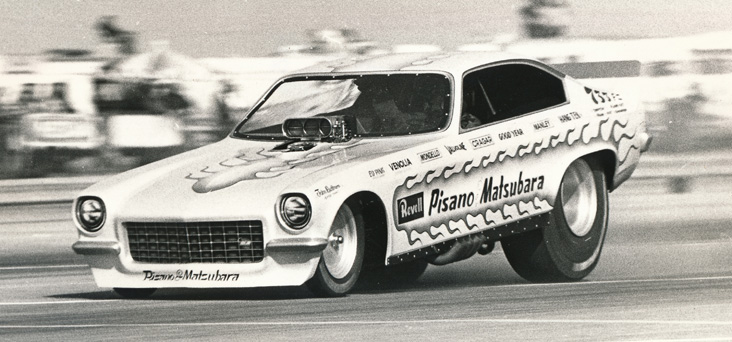
Here’s a happier moment for Matsubara and his longtime car owner Joe Pisano, steaming through the traps at Bakersfield in 1973. This car holds a special meaning to be as it was the subject of the first Revell model kit I ever built and made me a Pisano & Matsubara fan for life.


This is kind of a stupid-happy photo for me in a nerdy way. I love this moment, a car ready to be fired up for a night run (Ron Capps recently told me that sitting there getting ready to run is one of his favorite parts of driving a Funny Car). So what else caught my attention?
Take a look at photo at right you can see that Lewis also has another body-up photo of this car –- the Braskett & Burgin Vega of Dave Braskett and driver Gary Burgin –- where the body tin is red instead of gold and Burgin's firesuit is silver instead of yellow. Otherwise it looks like the same car at the same track (Orange County) though not necessarily the same evening. Is this some reflected trick of the light? Or did they really make those changes?
I’m easily amused and distracted by stupid minutiae like this (oooooh, shiny ...).

Another classic Funny Car moment -- the car staged, the pipes cackling hard, the grandstands packed – as Tom Hoover gets ready to rocket off the line at OCIR in 1972. White Bear Dodge, which is still in existence outside of the Twin Cities, was Hoover’s sponsor but was a fairly new dealership back then. The dealership was named for giant White Bear Lake, about 15 minutes north of Highway 61, and is one of the largest lakes in the Minneapolis-St. Paul region.
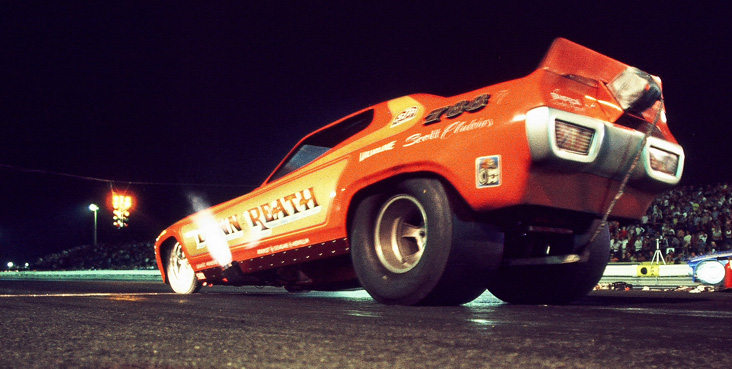
Slick low-angle shot of Jim Dunn staged and ready to rock at OCIR in 1974. Notice how the Tree is now suspended. Too many Trees chopped down, I’m guessing.

Another great mood shot from OCIR, with “the Mongoose,” Tom McEwen, getting ready to stage, a crewman shining a flashlight through the side window to illuminate the oil-pressure gauge in the dark cockpit and the flames incredibly high at idle. Love it!
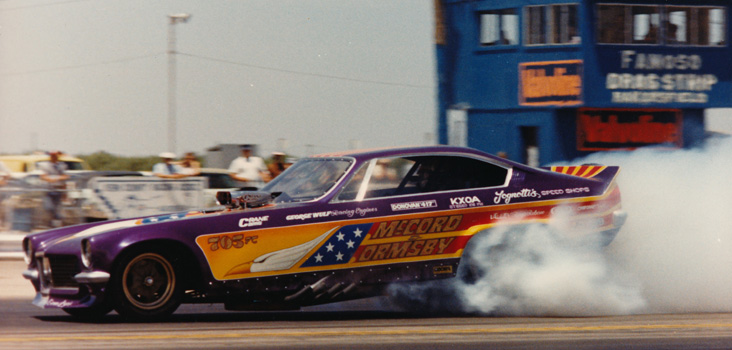
Here’s a real interesting little nugget. Yes, that’s future Top Fuel world champ Gary Ormsby behind the wheel of the McCord & Ormsby Vega –- he only drove Funny Cars in ’73 and ’74 when, like a lot of dragster pilots decided he needed to get in in the craze –- but who is McCord? Believe it or not, Dan McCord was a 15-year-old who was a co-owner of the car. He had worked on the Wulf & Ormsby Top Fueler in 1972 and then partnered with G.O. on the flopper the next two years. Nothing I can find explains where McCord got the money to help build a (then) $25,000 Funny Car. Must have been one hell of a paper route he had.
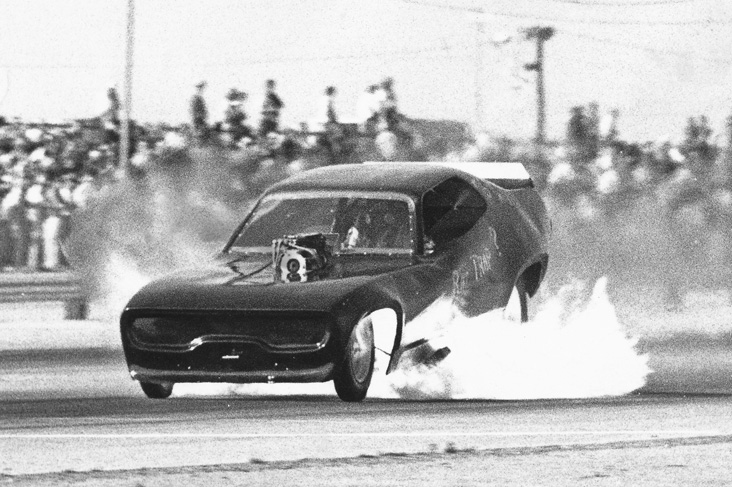
Jim Adolph got uncomfortably toasty in the Rat Trap Satellite of Dennis Fowler and Don Green at Bakersfield in 1973. With no paint and the car name shoe-polished on the side (with an odd question mark at the end) the car was either still new or recovering from a previous malady. Fowler went on to own the gorgeous Sundance Monza (cover of the final issue of Drag Racing USA magazine) while Green and the Rat Trap name continues on even today with a beautiful Fuel Altered.
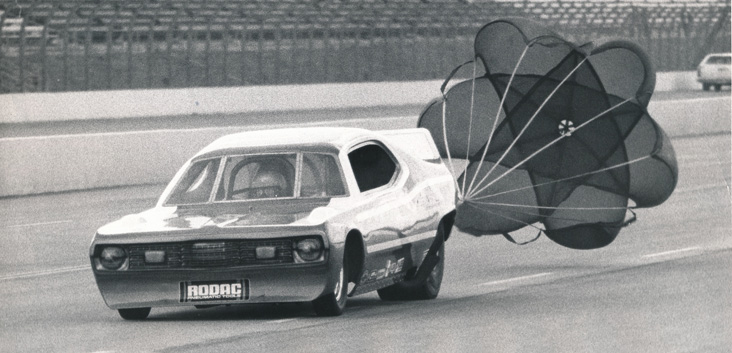
Speaking of Adolph, that’s him later in 1973 behind the wheel of Bert Berniker’s Hindsight rear-engined Duster at the Supernationals at Ontario Motor Speedway, where they did not qualify. I wrote a couple of columns about this infamous car (here and here) that struggled for more than two years to emulate the success of Jim Dunn’s rear-engine ‘Cuda (still –- and almost assuredly forever -- the only rear-engined Funny Car to win a national event) before it famously back-flipped at the 1975 Winternationals with Dennis Geisler behind the wheel.
Trivia answer: The only Funny Car final in the 16 combined events of the 1975 and '76 seasons that did not include Don Prudhomme was the 1975 Summernationals, where "Jungle Jim" Liberman defeated Tom Prock for his first and only NHRA national event title.
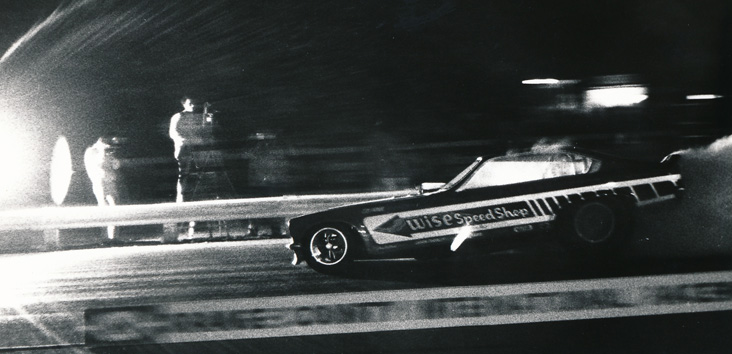
Chalk this one up to fortunate timing, as Lewis captured Paul “Wrong Way” Radici in mid-burnout at OCIR highlighted by the flash on another photographer on the other side of the track.

A decade later, ND’s Leslie Lovett would purposely reverse-mimic this technique by placing a remote strobe close to the starting line, then shooting with a long lens from downtrack as the sidelight invaded the cockpit, as you can see in the photo at right of Rodney Flournoy. The results were stunning. (BTW, I ran into Rodney several times last weekend at Pomona; he looked great, was smiling as always, and continues to compete alongside his daughter, Thais, in NHRA’s Hot Rod Heritage Series, where he was the Fuel Altered runner-up at the California Hot Rod Reunion. He’s still one of my all-time favorite people I’ve met in the sport.)
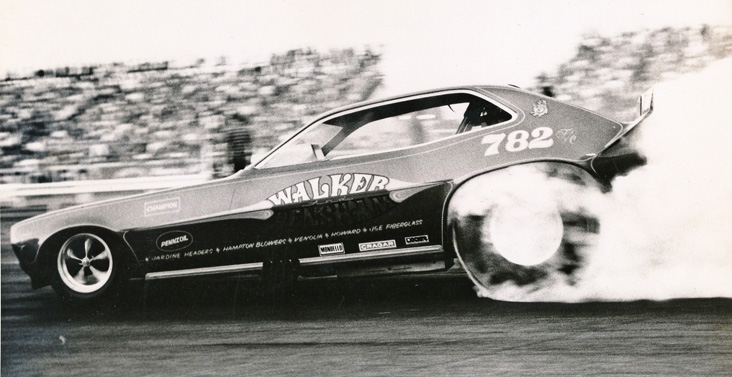
This is one of Gary Densham’s earliest Funny Cars, the Walker & Densham Pinto that ran 1971-73 before Densham went out on his own with his first Teacher’s Pet car in 1974. All these years later, another of my favorite drag racing people is still out there burning nitro.

And this, kids, is how we got on-car footage before GoPro cameras. Roland Leong’s Hawaiian, circa 1973.

Orange County Int’l Raceway was not just a great track for fans and racers, but for photographers, too. The trademark three-story Champion Spark Plugs tower afforded a great spot to shoot burnouts like this, of Danny Ongais in “Big John” Mazmanian’s ‘Cuda (we know it’s Danny O and not Rich Siroonian by the 799 on the car instead of 717; remember what I told you earlier?).
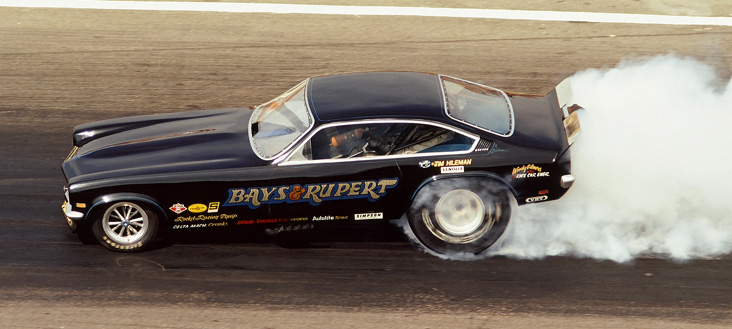
Another great shot from the OCIR tower. Frank Rupert, whose son, Jason, is one of the brightest stars in the Nostalgia Funny Car circuit, wheeled this Vega, dubbed “Black Plague," with partner Richard Bays in the early 1970s. Jason Rupert is partnered on the nostalgia car with former ND staffer Brad Littlefield, son of longtime SoCal Funny Car racer Mert, and the duo will make the transition to the “big show” early next year, following the path traveled by both of their fathers.
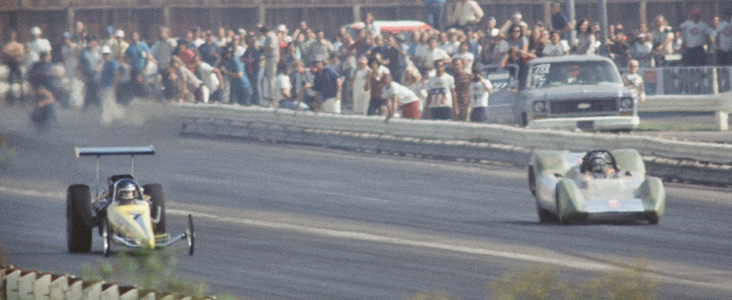
This could have easily been used in the 1970s Top Fuel segment as it shows Jim Dunn, far lane, racing in Top Fuel with a streamliner body atop the chassis of his rear-engined Funny Car at the June 1973 AHRA Grand American event at OCIR. Dunn and Doug Kruse built the body is less than two weeks to counter Don Garlits, who was unveiling his equally short-lived Wynn’s Liner streamliner. Dunn actually qualified and won a round while Garlits’ car, driven by Butch Maas, also made the field but did not run the first round. "Garlits had just come out with his streamliner, and he was getting all of the ink," Dunn explained to me a few years ago. "We were just trying to take some of the spotlight away from Garlits and wanted to prove we could run as good as him." This also was a great angle to shoot from at OCIR as there was a tall berm that paralleled the track on the right side hat provided the proper elevation.
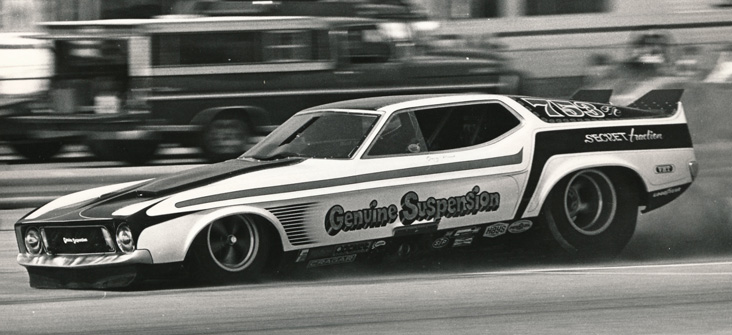
I don’t remember the car being this much of a low rider but check out the body-dragging attitude of Frank Thomas’ Genuine Suspension Mustang (driven here in Bakersfield by Dean LaPole). I’m not sure what kind of “genuine suspension” this car had on it, but maybe not enough?
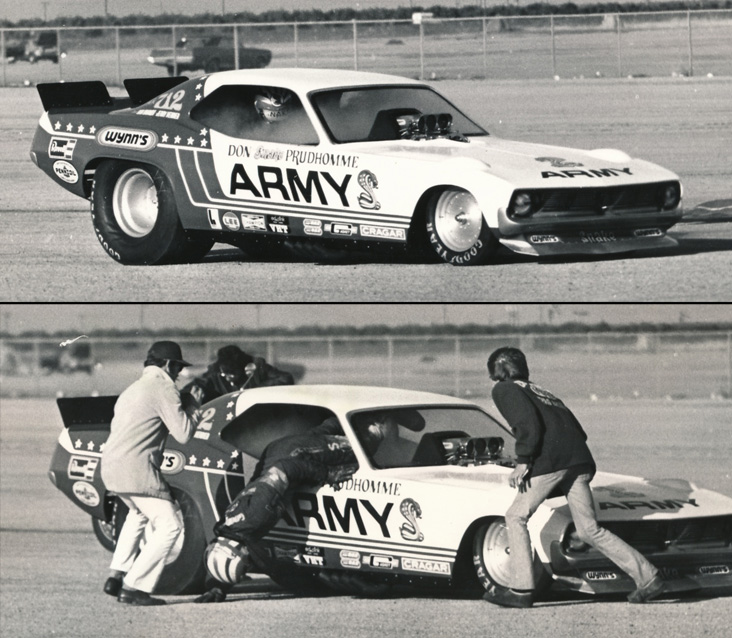
We started with Prudhomme and we’ll end with “the Snake” as well and this two-photo pairing of his bailing out of the Army Barracuda at the top end in Bakersfield in 1974 after some sort of malfunction that left the cockpit filled with smoke. The story behind the car is an interesting one told before, but worth retelling. The 1974 season was the first for “the Vipe” with the Army, and he commissioned John Buttera to build him an appropriately bad-ass flopper. The Vega that Lil John built had every trick in the book and was super low, but also super laden with headaches. After a few races, Prudhomme sidelined the trick piece (eventually selling it to Tom Hoover) and hauled his 1973 Indy-winning Carefeee Gum-backed Barracuda out of mothballs and repainted it in the Army colors and immediately won the Gatornationals and, later that year, Indy again, before moving onto the fabled Army Monza (which did not win Indy in either year of its existence).
Also worth noting in the top photo are the front fender bubbles that first began appearing on cars in the 1973 season as teams looking for better aerodynamics were able to lower the nose of the body another couple of inches thanks to the extra tire clearance afforded by the bubbles.
OK, that’s it for the trop down ‘70s Funny Car memory lane. I honestly could have included 100 of Lewis’ photos here and had something to say about each of them, but maybe that’s for another day. Thanks for following along.
Phil Burgess can reached at pburgess@nhra.com


